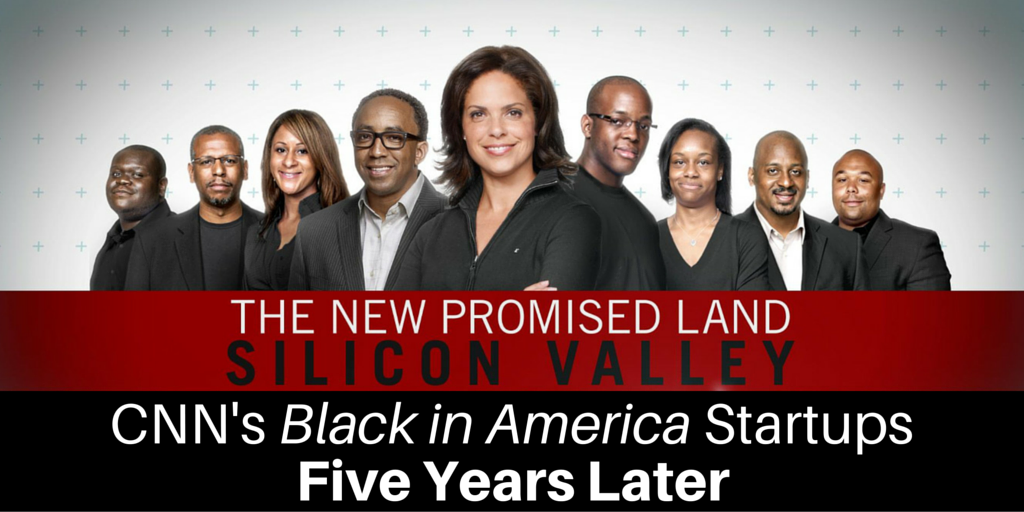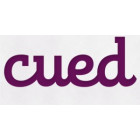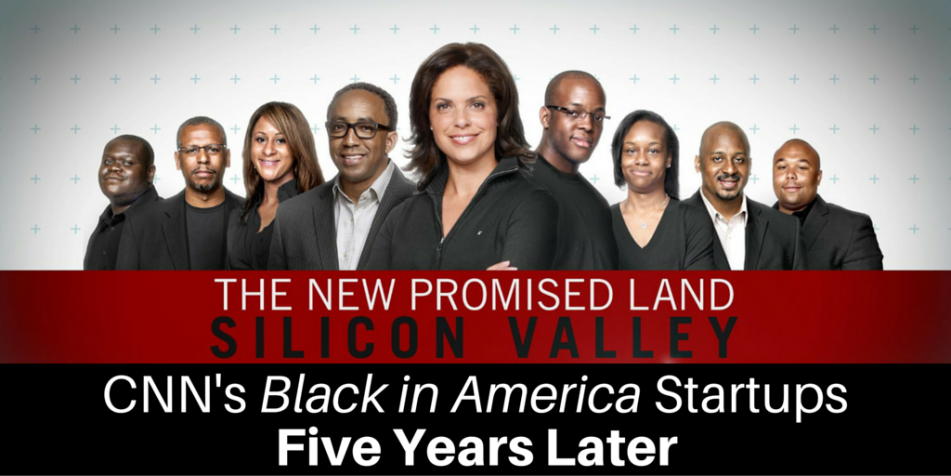
In 2011 CNN aired the fourth part of their Black in America documentary series.
Titled The New Promised Land, the film took viewers to Silicon Valley and introduced them to a group of black entrepreneurs chasing their dreams at the NewME Accelerator. This startup accelerator specifically was developed to help African-American digital entrepreneurs secure funding to establish their businesses, and a number of promising businesses were highlighted by CNN correspondent Soledad O’Brien and the Black in America team.
Now, in 2016, and during this week where The DOZ Blog recognizes Black History Month, it’s time to see what has become of the startups and entrepreneurs that CNN introduced to the nation. Five years on, which startup is flying, which idea is blossoming, and which have fallen along the way?
Here’s a look at the startups of The New Promised Land half a decade down the line.
GoKit
Founder: Hajj Flemings
From: Detroit, Michigan
The Pitch: GoKit is a one-stop shop for your professional online platform. It encompasses who you are professionally, personally and socially – and puts it all in a package that’s downright sexy to look at and share.
In 2011: “I hail from the great Midwest — Detroit specifically — and I love it. People might be surprised to hear it, but Detroit is really starting to build a startup ecosystem. Still, it’s nothing like the environment in Silicon Valley. I knew that if I wanted to get a startup off the ground, I needed to get out and go to events.” – as told to CNN
In 2016: Crashed and burned. The GoKit website is still online, but even the links on the site redirect to Archive.org pages. While the entrepreneur behind the site, Hajj Flemings, has gone on to bigger and better things, GoKit didn’t get the traction it needed to succeed. For GoKit, Silicon Valley did not prove to be a new promised land.
Vouch
Co-Founder: Wayne Sutton
From: Raleigh, North Carolina
The Pitch: Vouch allows you to recommend or ‘vouch’ for a person in your network. It lets others know that you consider this person to be, for example, professional, a great public speaker, or an expert in technology.
In 2011: “We started kicking around the idea of an accelerator back in February, and the whole thing has moved pretty fast. I’m focusing on managing the house; I will clean the toilets if I have to. We’re trying to make history here.” – as told to CNN
In 2016: Never got going. Wayne Sutton was one of driving forces and founders behind the NewME Accelerator and admitted later he was never really passionate about Vouch as a product. Vouch was pitched in the Valley but Sutton quickly pivoted to expanding the NewME project nationally, and has since moved into social media where he has established a place as one of the most influential black voices in the space.
BeCouply
Co-Founder: Pius Uzamere
From: Washington, DC
The Pitch: BeCouply helps couples discover new date spots and ideas, capture special moments and then connect with their couple friends.
In 2011: “My startup, BeCouply, helps couples have epic social lives. I realized there wasn’t a lot out there for couples who don’t want to fall into the trap of dinner and a movie every Friday night. I got the idea when I met Becky Cruze, my girlfriend and co-founder. I really wanted to impress her by building something we could use, and the more we talked to other couples the more we realized it could be a real business.” – as told to CNN
In 2016: Died a slow death. Dating apps are hard to get off the ground and it is no easier when the couple already knows each other. BeCouply still has their website up and they never got around to shutting down their Twitter feed, but the app is dead in the water and hasn’t had any press since 2014. BeCouply never got past seed funding and the accelerator program at NewME but the co-founders have gone on to great things nonetheless.
Playd
Co-Founder: Anthony Frasier
From: Newark, New Jersey
The Pitch: Playd is like Foursquare for gamers: you can “check in” when you’re playing a game on a console or your phone, and rate how much you like it. You can also discuss and share with your friends.
In 2011: “I started contributing a lot of content on forums for a certain video game website, and my commentary attracted so much attention that I brought the site a lot of extra traffic. I figured, if this is going so well, then I might as well do it myself. So I started The Koalition, a gaming site aimed at urban youth. It was a new approach, and it really took off. I started working with some other startups, which was great, but I still wanted to do stuff with video games. I thought, why not an app? That’s how Playd was born.” – as told to CNN
In 2016: Gone. While Playd was a great concept, it was overtaken by native, baked in functionalities in games, on consoles, and on social game platforms. In other words, Playd had the idea, but they couldn’t match the simplicity of being the in-house rating and discussion tool for gamers. Frasier didn’t abandon technology altogether, though he did return to the east coast and his native New Jersey where he is a leader, and a driver of innovation in the local technology scene.
Pencil You In
Co-Founder: Tiffani Bell
From: Fayetteville, North Carolina
The Pitch: Pencil You In is a site where people can book salon appointments online, making the process much easier for customers and businesses. It also helps salons expand their social media presence on sites like Twitter and Facebook.
In 2011: “Coming in as a double minority – a black woman – has been tough in the tech space. It’s also hard being located in North Carolina. I live about an hour from Raleigh and Durham, where there’s a pretty healthy VC community. But the tech scene there is just as homogenous in some respects, plus you just don’t have the access to people like you do in Silicon Valley. It’s been great to talk to these big names – and to show that a lot of us in the tech space might not fit the image of what you’d expect.” – as told to CNN
In 2016: Failed. Tiffani Bell is refreshingly honest in explaining why her idea ultimately failed. Though it generated revenue early on, her focus on engineering the product instead of working on other parts of the startup business forced her hand. As she tells it, “When Pencil You In began generating revenue, there was no long-term plan around what to do with it. Expenses piled up where they shouldn’t have. Features were built that shouldn’t have been. I entered “partnerships” that mostly ended up lining the pockets of other companies. Even worse, Pencil You In essentially served as research and development for much better funded, yet entirely less creative competitors.” Bell, though, is a star, and is currently Executive Director of the Detroit Water Project.
Kloud.co
Co-Founder: Hank Williams
From: New York, New York
The Pitch: Kloud.co puts all your personal data in the cloud and lets you search it. It’s like a Google search engine for your information universe. You can explore your e-mails, tweets, documents, contacts, calendar and more.
In 2011: “I’ve started several tech companies. My biggest was an Internet radio company called Clickradio, which I launched in 2000. It was somewhat like Pandora; you could give a song a thumbs up or thumbs down, and learn more about the artist. We scored licensing deals with the big five music studios and secured $40 million in funding.” – as told to CNN
In 2016: Gone. Kloud, later Kloudco, never attracted much interest or funding, perhaps coming a little late in the cloud computing revolution to really make a mark. Hank Williams, though, remained a strong voice for diversity in technology, both in Silicon Valley and beyond. Sadly, Williams died in late 2015. While his Kloudco project never got traction, his advocacy for minorities in technology lives on.
Fetchmob
Co-Founder: Crisson Jno-Charles
From: Stoughton, Massachusetts
The Pitch: Fetchmob is a site where users can post shopping requests for friends to take on. Maybe your friend is at the grocery store and wouldn’t mind picking up some tomatoes for you. Or you could drop off an item for another student in your dorm.
In 2011: “A friend of ours in North Carolina was in a lot of pain and needed to pick up some Tylenol, but he didn’t have a way to get there. It would’ve been great if someone who lived in his area and was already out shopping could have bought Tylenol for him.” – as told to CNN
In 2016: A couple of years in, then out. Visit the Fetchmob website and there’s not much there except for a promise of Fetchmob 2.0 coming soon. However, when even the co-founder only lists the company on their LinkedIn profile as a business that died in 2012, it’s probably safe to say that Fetchmob 2.0 is not going to arrive. The idea, though, had merit, and everyone from Uber to Amazon, Task Rabbit and others have taken the notion of the sharing economy on board. Fetchmob needed traction, but sadly didn’t find it.
Cued
Co-Founder: Angela Benton
From: Charlotte, North Carolina
The Pitch: Cued is an app that gives you recommendations based on where you are, what you like and your past experiences. For example, if you tell Cued that you like a specific bar and you also like karaoke and draft beer, the system will make recommendations for more places you’ll like.
In 2011: “We got the idea of creating a “startup house” to get people out to California, and that eventually morphed into NewMe. Wayne (Sutton) and I put the whole thing together in three months, which shows how well we work together as a team. Running the accelerator and my own startup has been a lot to balance, and some days are better balanced than others.” – as told to CNN
In 2016: Never off the ground. Cued was put on hold as Benton focused on getting the NewME Accelerator off the ground with Wayne Sutton. Benton was successful in driving NewME forward, but didn’t return to Cued. At this point, the functionality baked into most social networks means a tool like Cued just wouldn’t work as a standalone app. However, Benton has proved that her skills lie in technology, promotion, connecting, publishing, and growth – what was once a house in the Valley full of dreamers is now an international accelerator under her leadership.
Conclusions: Black in America Startups – Failures?
On the surface it is hard to conclude anything other than that the startups featured in the Black in America documentary all failed. Every single one. Some failed fast, some failed a little slower, but five years later not a single one remains a going concern as originally conceived.
But does this mean that the founders, too, have failed?
Not at all.
Few startups gain the traction they need to make the founders millionaires in short order. Indeed, the number of Silicon Valley founders who made it are far outnumbered by the entrepreneurs who gave it their all and didn’t.
What’s clear from revisiting these stories is that, in almost every case, the entrepreneur behind the failing idea picked up and launched a new business, or helped others to launch a new business, or found a new product and – almost always – found professional success.
So go the startup stories that are the most inspirational of all. In the end, who wants to hear about the 20-year-old drop out who has one good idea and sells it for a million dollars three months later? The most inspiring, most vital and truest to life stories are the ones that see the hero fail, fail, and fail again – before one day making it to the top.
And that’s why, five years later, we’re still writing about those eight black entrepreneurs from The New Promised Land.



116 Comments
In the words of Don King:
“ONLY IN AMERICA”
Asking questions are actually nice thing if you are not understanding anything fully, but this post offers good understanding even.
Sutter Health
Hi, I do think this is a great blog. I stumbledupon it 😉 I’m going to revisit once again since I bookmarked it.
Money and freedom is the best way to change, may you be rich and continue to guide others.
If some one wishes to be updated with hottest technologies afterward he must be go
to see this web site and be up to date every day.
No matter if some one searches for his vital thing, thus he/she
desires to be available that in detail, therefore that thing is maintained over
here.
Hi there exceptional blog! Does running a blog like this require a great deal of
work? I have absolutely no knowledge of computer programming but I was hoping to start my
own blog soon. Anyhow, should you have any suggestions or tips for new
blog owners please share. I know this is off subject but I just needed
to ask. Thanks a lot!
Write more, thats all I have to say. Literally, it seems as though
you relied on the video to make your point. You clearly know what youre
talking about, why throw away your intelligence on just posting videos
to your site when you could be giving us something informative to read?
I like what you guys are up too. This kind of clever work and
reporting! Keep up the great works guys I’ve included you guys to my personal blogroll.
I got this web page from my pal who shared with me regarding this website and now this time I am visiting this web site and reading very informative articles or reviews here.
Its like you learn my mind! You seem to know so much about this, like you wrote the
guide in it or something. I believe that you simply could do with some percent
to drive the message home a bit, but other than that,
that is fantastic blog. A fantastic read. I will definitely be back.
Unquestionably believe that which you stated. Your favorite justification appeared to be on the web the simplest thing to be aware of.
I say to you, I certainly get annoyed while people consider worries that
they just do not know about. You managed to hit the nail upon the top and defined out the whole thing without having side effect , people could take a signal.
Will likely be back to get more. Thanks
Hello there! I simply wish to offer you a big thumbs up for the excellent information you have got right here on this post.
I am returning to your site for more soon.
This piece of writing offers clear idea for the new
people of blogging, that in fact how to do running a blog.
Oh my goodness! Amazing article dude! Thank you, However I am encountering difficulties with your RSS.
I don’t understand why I am unable to join it.
Is there anyone else having the same RSS
problems? Anyone that knows the answer will you kindly respond?
Thanx!!
Greetings! Very helpful advice in this particular post! It’s the little changes which will make the biggest changes. Thanks a lot for sharing!
We are a group of volunteers and starting a new scheme in our community.
Your web site provided us with valuable info to work on. You’ve done a formidable job
and our whole community will be thankful to you.
Wow, awesome blog structure! How lengthy have you ever been blogging
for? you made running a blog look easy. The full glance of your
site is wonderful, let alone the content!
Very good post! We will be linking to this particularly great content on our site.
Keep up the good writing.
I every time spent my half an hour to read this web site’s posts everyday along with a mug of coffee.
I’d like to thank you for the efforts you have put in writing this site.
I really hope to check out the same high-grade blog posts from you later on as well.
In truth, your creative writing abilities has motivated me to get my
own site now 😉
I’m gone to say to my little brother, that he should also visit this webpage on regular
basis to obtain updated from hottest reports.
Fabulous, what a website it is! This web site provides useful data to us, keep it up.
This design is spectacular! You most certainly know how to keep a reader entertained.
Between your wit and your videos, I was almost moved to start my
own blog (well, almost…HaHa!) Great job.
I really enjoyed what you had to say, and more than that, how you presented it.
Too cool!
Hi there it’s me, I am also visiting this web site on a regular basis, this website is
truly nice and the people are in fact sharing good
thoughts.
I am in fact glad to glance at this blog posts
which includes tons of valuable facts, thanks for providing such data.
Nice blog here! Also your web site loads up very fast!
What web host are you using? Can I get your affiliate link to your host?
I wish my web site loaded up as fast as yours lol
Quality posts is the secret to be a focus for the users to pay a
visit the web site, that’s what this web page is providing.
I needed to thank you for this wonderful read!!
I definitely enjoyed every little bit of it. I have you saved as a favorite to look at new things you post…
What a material of un-ambiguity and preserveness of precious experience on the
topic of unpredicted emotions.
Thanks very interesting blog!
I’ll immediately snatch your rss as I can’t to find your email subscription link or newsletter service.
Do you’ve any? Kindly allow me recognize so that I could subscribe.
Thanks.
Thanks a lot for sharing this with all folks you actually realize what you’re
speaking about! Bookmarked. Kindly additionally discuss with my website =).
We may have a hyperlink alternate arrangement among us
whoah this weblog is wonderful i like reading your articles.
Stay up the great work! You realize, lots of people are looking round for this information, you could help them greatly.
When I initially commented I clicked the “Notify me when new comments are added” checkbox and now
each time a comment is added I get three emails with the same comment.
Is there any way you can remove people from that service? Thank you!
I always used to read article in news papers but now as I am a user
of internet thus from now I am using net for articles, thanks
to web.
Greetings! Very helpful advice in this particular post!
It is the little changes which will make the largest changes.
Many thanks for sharing!
Great info. Lucky me I ran across your blog by accident (stumbleupon).
I’ve bookmarked it for later!
Hello, i think that i saw you visited my website so i came to “return the favor”.I am trying to find things
to enhance my web site!I suppose its ok to use a few
of your ideas!!
Genuinely no matter if someone doesn’t understand afterward its up to other visitors that
they will help, so here it takes place.
magnificent put up, very informative. I ponder why the opposite specialists of this sector do
not notice this. You should continue your writing. I’m sure, you
have a huge readers’ base already!
Hello there, just became aware of your blog through Google, and
found that it’s truly informative. I am gonna watch out for brussels.
I will appreciate if you continue this in future. Many people will be benefited from
your writing. Cheers!
For most up-to-date information you have to go to see the web
and on world-wide-web I found this website as a best site for
hottest updates.
Hello there, just became alert to your blog through Google, and found
that it’s really informative. I am going to watch out for brussels.
I will be grateful if you continue this in future.
A lot of people will be benefited from your writing. Cheers!
Link exchange is nothing else except it is just placing the other person’s website link on your page at appropriate place and other person will also do similar in support
of you.
Thank you, I’ve recently been looking for information about this subject for a while and yours is the best
I have found out till now. But, what about the bottom line?
Are you certain in regards to the supply?
Remarkable! Its truly amazing paragraph, I have got much clear idea about from this
post.
Excellent, what a website it is! This blog gives useful information to us,
keep it up.
Its like you read my mind! You seem to know so much
about this, like you wrote the book in it or something. I think
that you can do with some pics to drive the message home a little bit, but instead of that, this is magnificent blog.
A fantastic read. I’ll certainly be back.
It is actually a nice and useful piece of info.
I am glad that you shared this helpful information with us.
Please stay us up to date like this. Thank you
for sharing.
Hi there, I found your website by way of Google even as
looking for a related subject, your website came up, it seems
great. I’ve bookmarked it in my google bookmarks.
Hi there, just turned into alert to your blog through
Google, and found that it’s truly informative.
I’m going to watch out for brussels. I’ll
be grateful in the event you proceed this in future.
Numerous other people will be benefited out of your writing.
Cheers!
Wonderful post! We will be linking to this particularly great article on our site. Keep up the good writing.
Way cool! Some very valid points! I appreciate you penning this post and the rest of the website is also really good.
I’m not sure where you’re getting your info,
but good topic. I needs to spend some time learning much more or understanding more.
Thanks for fantastic information I was looking for this info for my
mission.
I have been browsing online greater than 3 hours today, but I by no means discovered any fascinating article like
yours. It is beautiful value enough for me. In my opinion, if all webmasters
and bloggers made just right content material as you did, the net shall be much more useful
than ever before.
you are actually a good webmaster. The web site loading velocity is incredible.
It seems that you are doing any distinctive trick. Moreover, The
contents are masterpiece. you have performed a wonderful job in this matter!
Hey there would you mind letting me know which webhost you’re utilizing?
I’ve loaded your blog in 3 completely different browsers and I must say
this blog loads a lot faster then most. Can you recommend a good internet hosting provider at a reasonable price?
Kudos, I appreciate it!
You’re so awesome! I don’t believe I’ve read through something
like this before. So nice to discover someone with unique thoughts on this topic.
Seriously.. thanks for starting this up. This site is something that is needed on the web,
someone with some originality!
Hi there, the whole thing is going nicely here and ofcourse every one is sharing
facts, that’s genuinely excellent, keep up writing.
Hi! Would you mind if I share your blog with my zynga group?
There’s a lot of people that I think would really enjoy your content.
Please let me know. Many thanks
Having read this I thought it was very informative.
I appreciate you spending some time and energy to put this informative article together.
I once again find myself spending way too much time both
reading and leaving comments. But so what, it was still worthwhile!
Fantastic website you have here but I was wanting to know if you
knew of any message boards that cover the same topics talked about here?
I’d really love to be a part of group where I can get comments from other
experienced people that share the same interest. If you have
any suggestions, please let me know. Appreciate it!
I just couldn’t leave your website before suggesting that I extremely loved the usual information a person supply on your visitors?
Is gonna be back ceaselessly to inspect new posts
Terrific work! This is the kind of information that are meant to be shared across the web.
Shame on the search engines for not positioning this publish upper!
Come on over and talk over with my web site . Thanks =)
Hello, everything is going sound here and ofcourse every one is sharing facts, that’s
genuinely good, keep up writing.
I am extremely impressed together with your writing skills and also with the format in your weblog.
Is that this a paid topic or did you customize it yourself?
Either way stay up the nice high quality writing, it’s
uncommon to see a great weblog like this one today..
Amazing blog! Do you have any helpful hints for aspiring writers?
I’m hoping to start my own site soon but I’m a little lost on everything.
Would you propose starting with a free platform
like WordPress or go for a paid option? There are so many choices out there that I’m completely overwhelmed ..
Any recommendations? Appreciate it!
That is really interesting, You are a very professional blogger.
I have joined your rss feed and stay up for searching for extra
of your great post. Additionally, I’ve shared your web
site in my social networks
If you desire to obtain much from this post then you have to apply these methods to your won blog.
I really like it when folks get together and share ideas.
Great website, stick with it!
you’re really a just right webmaster. The website loading speed is incredible.
It kind of feels that you are doing any unique trick.
In addition, The contents are masterwork. you have done a wonderful activity in this topic!
What’s Happening i’m new to this, I stumbled upon this I’ve discovered
It positively useful and it has helped me out loads. I am hoping to contribute & aid different customers like
its helped me. Good job.
Hi i am kavin, its my first occasion to commenting anywhere, when i
read this paragraph i thought i could also make comment
due to this sensible piece of writing.
Way cool! Some extremely valid points! I appreciate you penning this write-up and also the rest of the website is extremely good.
I’m not sure where you are getting your info, but good topic.
I needs to spend some time learning more or understanding
more. Thanks for excellent information I was looking for this information for my mission.
Hey I know this is off topic but I was wondering if you knew of any widgets I could add to my blog that
automatically tweet my newest twitter updates. I’ve been looking for a plug-in like this
for quite some time and was hoping maybe you would have some
experience with something like this. Please let me know if you run into anything.
I truly enjoy reading your blog and I look forward to your new updates.
Hi mates, how is the whole thing, and what you want to
say regarding this paragraph, in my view its actually amazing in favor of me.
Hmm it looks like your blog ate my first comment (it was super long) so I guess I’ll just sum it up what I submitted and say,
I’m thoroughly enjoying your blog. I too am an aspiring blog writer but I’m still new to everything.
Do you have any recommendations for newbie blog writers?
I’d certainly appreciate it.
I like the helpful info you supply to your articles.
I’ll bookmark your weblog and test again right here frequently.
I’m rather certain I will be informed many new stuff proper here!
Good luck for the next!
As big, hair dryer-style massage guns go, the TaoTronics offers a lot to like.
Vanderbilt plays its property basketball games on the recognizable elevated stage of Memorial Gymnasium in Nashville.
The American company SB22 has developed a virtual reality betting platform referred to as VR22 which
was released in September 2022.
Woah! I’m really digging the template/theme
of this site. It’s simple, yet effective. A lot of times it’s very difficult to get that “perfect balance”
between usability and visual appeal. I must say you have done a awesome job with
this. Additionally, the blog loads extremely
fast for me on Firefox. Outstanding Blog!
Several casinos give away cashback bonuses as part of a loyalty scheme.
This article will feature the major online gambling in South Korea.
Watch the private life of other people live. Real life cam sex voyeur videos for free
What you published was very reasonable. However, what about this?
what if you added a little content? I ain’t saying your content is not good, however what if you added something that makes people desire more?
I mean CNN’s Black in America Startups: 5 Years Later | DOZ is
a little plain. You ought to peek at Yahoo’s home page and
see how they create post headlines to get viewers
to click. You might add a video or a picture or two to grab
people interested about what you’ve written. Just my opinion, it could bring your
posts a little bit more interesting.
Thank you for the auspicious writeup. It in fact was a leisure account it.
Look complicated to more delivered agreeable from you!
However, how can we keep in touch?
What’s Happening i’m new to this, I stumbled upon this I have found It
absolutely useful and it has aided me out loads.
I hope to give a contribution & help different users like its aided
me. Good job.
Right now it looks like BlogEngine is the best blogging platform available right now.
(from what I’ve read) Is that what you are using on your blog?
Pretty nice post. I just stumbled upon your blog and wanted
to say that I’ve really enjoyed browsing your blog posts. After all I’ll be subscribing to your rss feed and I hope you write again soon!
Hi! I know this is kind of off topic but I was wondering if you knew where I could get a captcha plugin for my comment form?
I’m using the same blog platform as yours and I’m
having problems finding one? Thanks a lot!
Heya i’m for the first time here. I found this board and I find It truly useful & it helped me out much.
I hope to give something back and aid others like you helped me.
Undeniably believe that which you said. Your favorite justification appeared to
be on the net the easiest thing to be aware of. I say to you, I definitely get annoyed while people consider
worries that they just do not know about. You managed to hit the nail
upon the top and also defined out the whole thing without having side-effects , people can take a signal.
Will probably be back to get more. Thanks
What a data of un-ambiguity and preserveness of precious familiarity
concerning unexpected feelings.
I am really loving the theme/design of your weblog.
Do you ever run into any internet browser compatibility issues?
A couple of my blog visitors have complained about my website not operating correctly in Explorer but looks
great in Firefox. Do you have any advice to help fix this issue?
Hello, its fastidious article concerning media print, we
all know media is a impressive source of data.
Of course, you should really also only trust licensed and regulated
on the net casinos.
I’m really enjoying the design and layout of your site.
It’s a very easy on the eyes which makes it much more
enjoyable for me to come here and visit more often. Did you hire out a developer
to create your theme? Outstanding work!
bossa nova lounge
coffee shop ambience
Nice post. I learn something new and challenging on blogs I stumbleupon on a daily basis.
Nice post. I learn something totally new and challenging on websites
I very delighted to find this internet site on bing just what I was searching for as well saved to fav
Pretty! This has been a really wonderful post. Many thanks for providing these details.
I m going to bookmark your web site and maintain checking for brand spanking new information.
I really like reading through a post that can make men and women think. Also thank you for allowing me to comment!
326346 727443extremely good post, i certainly love this exceptional site, keep on it 531796
https://twitter.com/cashapphack2024/status/1787496758789959832
FAMILY ISLAND Unlimited Rubies FAMILY ISLAND Online Generator FAMILY ISLAND Hack 2024 FAMILY ISLAND Hack Version Ruby Coin FAMILY ISLAND FAMILY ISLAND Hack Apk 2024 How To Hack FAMILY ISLAND FAMILY ISLAND Hacks FAMILY ISLAND Unlimited Energy Hack Android FAMILY ISLAND Energy Hack
FAMILY ISLAND Energy Generator FAMILY ISLAND Hack Mod Apk Download FAMILY ISLAND Hack Ios FAMILY ISLAND Hack Version FAMILY ISLAND Free Rubies FAMILY ISLAND Hack Version Download FAMILY ISLAND Game Hacks FAMILY ISLAND Hack Without Verification FAMILY ISLAND Energy Hack Bit Ly FAMILY ISLAND Hack FAMILY ISLAND Hacks FAMILY ISLAND Hack Version FAMILY ISLAND Hack Version Download
SEO, SMS, Local SEO service provider In Sri Lanka
build backlinks…
Ready to take control of your financial future?
financial landscape!
Ready to take control of your financial future?
tax incentives!
Sri Lanka’s Premier Bookstore
cash on home book delivery !
FITIT is much more than an online training platform
windows server course!
Stay informed with Indiapresslive.com
Latest News>>>
marriextransfer
Family vacation destinations!